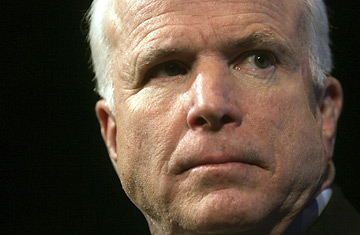
U.S. Senator John McCain (R-AZ) speaks at a McCain Exchange Forum in the Millennium Broadway hotel March 8, 2007, in New York City. McCain touched on topics including the war in Iraq, education and defense spending as he continues his 2008 Presidential campaign.
So why all the long faces? Because of the supposed dearth of real conservatives in the Republican Presidential field. Conservatives, as right-wing activist David Bossie told Politico, "are desperately looking for an heir to Reagan's mantle" and none of the front-runners "are up to that."
And what is that mantle, exactly? It starts, presumably, with militant opposition to taxes. But Reagan passed the largest tax hike in California history, and then as President, raised taxes three times. Fervent opposition to abortion is another must. But as governor, Reagan was pro-choice. And although pro-life by the time he entered the White House, he enraged the Christian Right by selecting a well-known social moderate, Sandra Day O'Connor, as his first Supreme Court pick. Then there's opposition to illegal immigration, another supposed Reagan legacy. Except that in 1986 Reagan signed a law granting amnesty to illegal immigrants who had lived continuously in the U.S since 1982. If John McCain, Mitt Romney and Rudy Giuliani aren't "Reaganesque," neither — by current standards — was Reagan himself.
Today's Republican Party is beginning to resemble the Democratic Party of the 1980s: a collection of activists demanding purity on an ever-lengthening list of parochial concerns. It's not enough that Mitt Romney now opposes abortion and gay rights; he supported them in the past. It's not enough that John McCain has a long anti-abortion record; he criticized Jerry Falwell and Pat Robertson. In recent years, while the Democratic Party has shed its litmus tests on the death penalty and gun control, and recruited pro-lifers to run for Congress, the G.O.P. has been adding litmus tests like crazy. And it's not just abortion and taxes anymore. Republican hopefuls must also toe the line on gays, stem cells, campaign finance and immigration. Even Newt Gingrich — once the paradigmatic right-wing ideologue — is suspect. According to Novak, his "conservative record is far from flawless."
When a party's special interests grow insatiable, it's a sign of two things. First, the party actually isn't that hungry to win. For the G.O.P., 2008 looks like a daunting year. It's hard for one party to win three straight Presidential elections even in the best of times. (It's only happened once in the last 50 years). And the radical unpopularity of the Bush Administration and the Iraq war will make it harder still. So conservatives should be thrilled they have candidates like McCain, Giuliani and Romney, with proven appeal to Democrats and independents. And they should understand that, given the dismal image of the Washington G.O.P., a Republican Presidential nominee must maintain a maverick or outsider image to have any shot at victory. Instead, even as McCain, Giuliani and Romney move frantically in their ideological direction, conservative activists are raising the bar and threatening to stay home next fall.
But the problem is deeper than an insufficient desire to win. For the last quarter-century, national security has been the glue holding the Republican coalition together. During Reagan's first term, conservatives overlooked his tax hikes and big spending because they thrilled to his vision of an America that rolled back Soviet power. In 2004, conservatives overlooked George W. Bush's prescription drug benefit and his liberal stance on immigration, and turned out for him in record numbers, because they believed so deeply in his war on terror. Now, by contrast, right-wingers carp endlessly about his domestic spending, even though his budgets have been leaner in his second term than in his first, because his foreign policy has become such a depressing affair.
McCain and Giuliani's candidacies, like Bush's in 2004, are Reaganesque: At base, they are about national security. But that foundation has now collapsed. McCain's support for the Iraq surge, and his tough talk on Iran, no longer rouses even G.O.P. audiences. And Giuliani's vague calls for staying on the offense against terrorists ring much hollower now that most Americans yearn to bring our troops home from Ramadi and Baghdad. As Tom Schaller recently noted in The American Prospect, the major speakers at CPAC barely mentioned Iraq at all.
Conservatives do have reason to feel glum. But it's not because Romney once backed abortion or McCain supports campaign finance reform. It's because virtually their entire movement (along with some hawkish liberals like me) endorsed a catastrophic war. That's the reason conservatives are having so much trouble getting excited about a candidate in 2008. And they have no one to blame but themselves.
Peter Beinart is a Senior Fellow at the Council on Foreign Relations.
